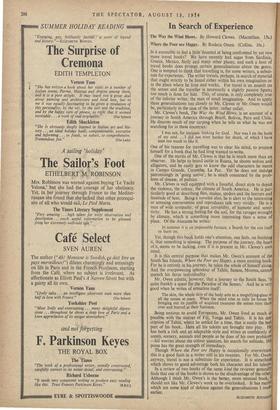In Search of Experience Is it excusable to feel a
little-daunted at being confronted by yet two more travel books? We have recently had sagas from Sardinia, Greece, Mexico, Sicily and many other places, and such a host of travel books does prompt certain generalisations about the genre. One is tempted to think that travelling is, for some writers, a substi- tute for experience. The writer travels, perhaps, in search of material that ought strictly to be found either within his own imagination or in the place where he lives and works. For travel is an assault on the senses and the traveller is necessarily a slightly passive figure; too much is done for him. This, of course, is only completely true of the inferior writer, the man of small imagination. And to apply these generalisations too closely to Mr. Clewes or Mr. Owen would be, particularly in the case of the latter, rather unfair.
Mr. Clewes's book, The Way the Wind Blows, is an account of a journey in South America through Brazil, Bolivia, Peru and Chile. He disarms much of our carping when he tells us what he was not searching for in these countries: I was not, for instance, looking for God. Nor was I on the heels of my, soul ... I did not even hanker for death, of which l have seen too much to like it.
One of his reasons for travelling was to clear his mind, to prepare himself for a book that he had long wanted to-write.
One of the merits of Mr. Clewes is that he is much more than an observer. He helps to brand cattle in Ruana, he shoots wolves and alligators, and he really gets to know the odd characters he meets in Campo Grande, Corumba, La Paz. Yet he does not indulge patronisingly in 'going native'; he is much concerned by the prob• lems of disease, of politics. Mr. Clewes is well equipped with a forceful, direct style to depict the violence, the colour, the climate of South America. He is par- ticularly good at describing flies, snakes, spiders and the horrors and lassitude of heat. Being a novelist also, he is alert to the interesting or amusing conversation and reproduces talk very vividly. He is a man of wide sympathy, of great intrepidity, of humour and sensi- tivity. He has a strong feeling for the soil, for the ravages wrought by climate, which is something more interesting than a sense of place. Of the Atacama he writes: In summer it is an impassable furnace, a hearth for the sun itself to burn on.
Yet, though this book holds one's attention, one feels, on finishing it, that something is missing. The purpose of the journey, the heart of it, seems to be lacking, even if it is present in Mr. Clewes's own mind.
It is this central purpose that makes Mr. Owen's account of the South Sea Islands, Where the Poor are Happy, a more exciting book For he is entirely in his journey, he takes the whole of himself along. And the overpowering splendour of Tahiti, Samoa, Moorea, cannot quench his fierce individuality. Mr. Owen admits, however, that a journey to the South Seas, `i quite frankly a quest for the Paradise of the Senses.' And he is very` good when he writes of sensation itself: The skin, the whole skin of the body acts as a magnifying-glass to all the senses at once. When the mind tries to rally its forces bY bringing out its jumble of acquired treasures the senses turn theta over and Marvel at their fustiness.
Being anxious to avoid Europeans, Mr. Owen lived as much al possible with the natives of Fiji, Tonga and Tahiti. It is his des• cription of Tahiti, whore he settled for a time, that is easily the best part of his book. Here all his talents are brought into play. I-11 has both a rich and an adaptable style and writes as confidently of scents, scenery, animals and people as he does of his own problent5 —hid worries about the colour question, his search for solitude. HO prose has the great strength of immediacy.
Though Where the Poor are Happy is occasionally overwritten this is a good fault in a writer still in his twenties. For Mr. Owen, anyway, travel is not a substitute for experience. It is somethinl which shows to good advantage both his character and his talents In a review of two books of the same kind the reviewer general': finds that one of the books is shown to the disadvantage of the othe Although I think Mr. Owen's is the better, more unusual book, should not like Mr. Clewes's work to be overlooked. It has merits which are some kind of defence against the generalisations I made earlier.
ELIZABETH JENNING


































 Previous page
Previous page